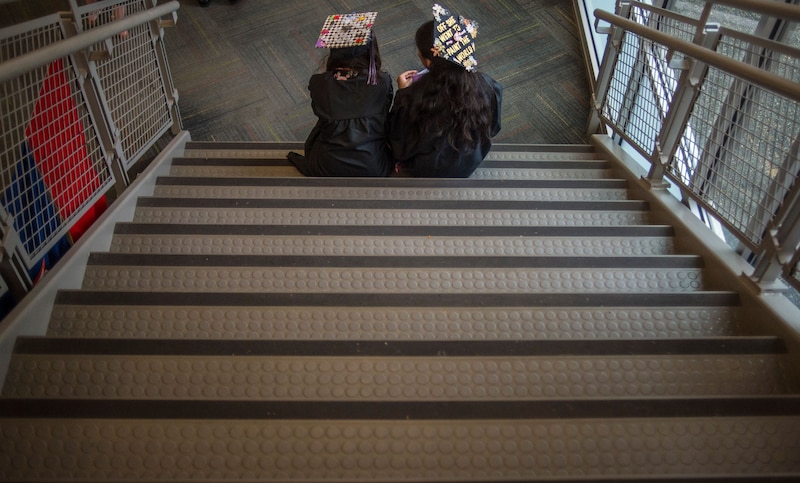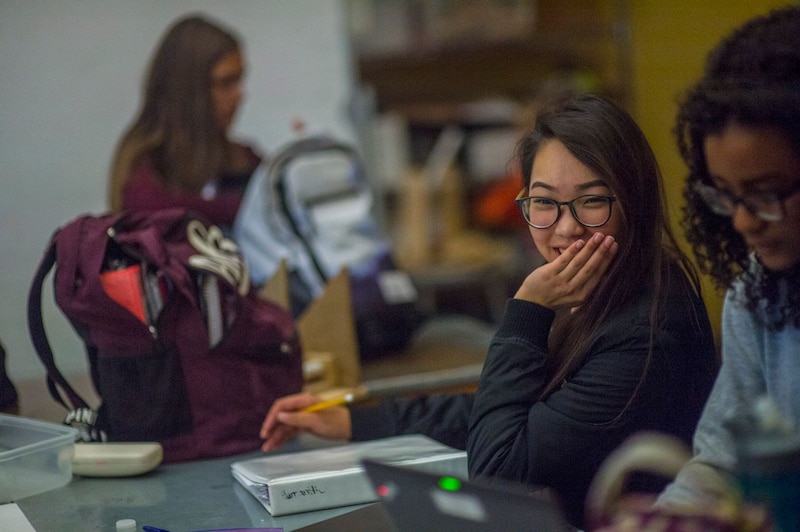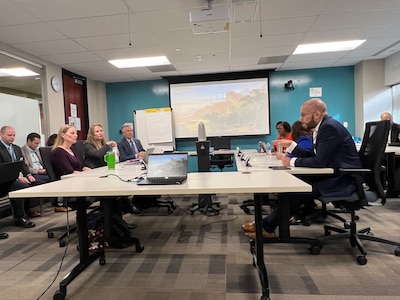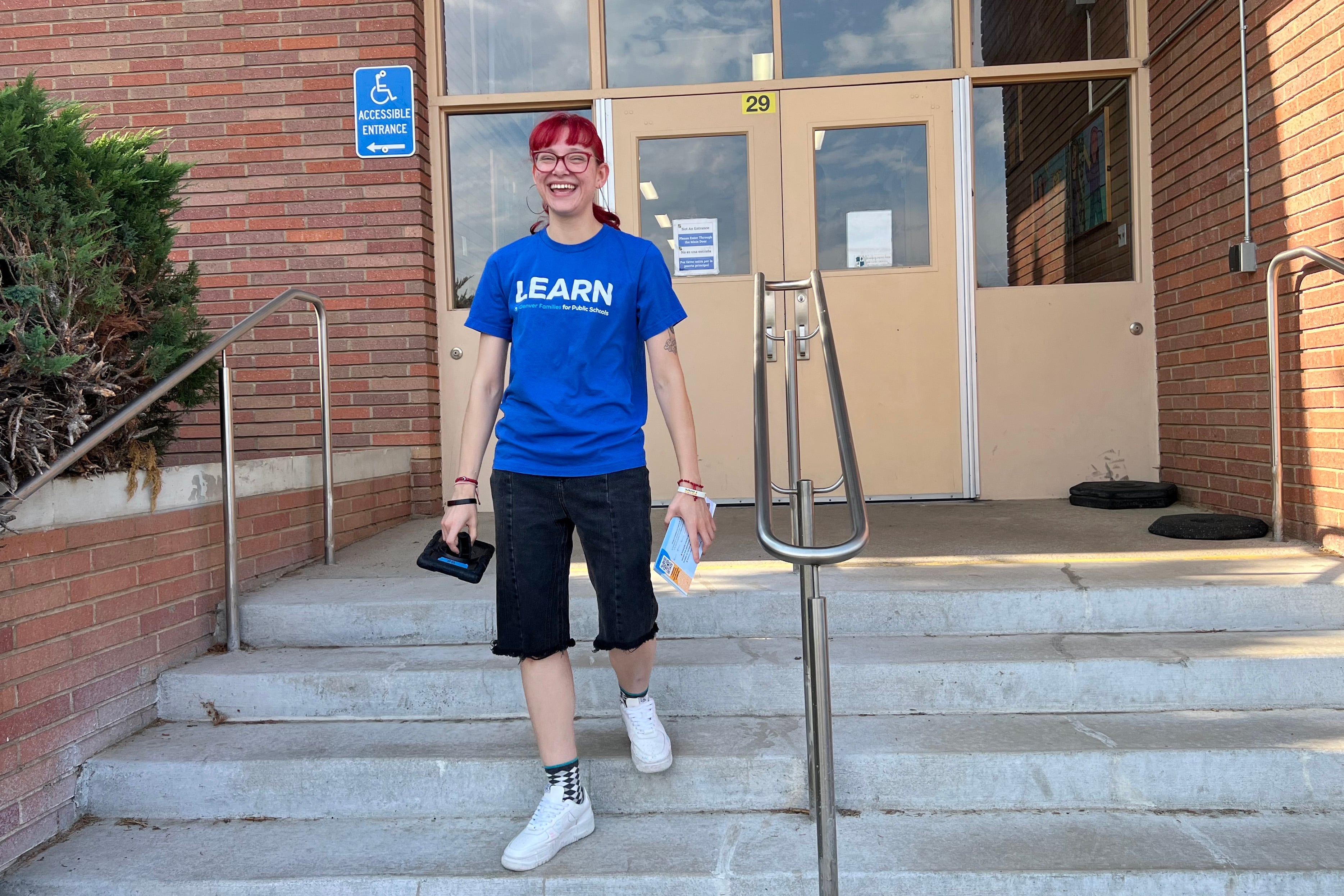Sign up for Chalkbeat Colorado’s free daily newsletter to get the latest reporting from us, plus curated news from other Colorado outlets, delivered to your inbox.
On a hot summer day, Darlenne Guerra Arevalo knocked on doors in southwest Denver. She had an armful of fliers, a small digital tablet with addresses, and a spiel.
“We’re just checking in with voters to see what you want to see for the future of public schools here in Denver, if you have two minutes,” she told one of the few people who answered the door.
The woman said she didn’t. So Guerra Arevalo sped up her pitch, handing the woman a QR code for a survey about the school board and the quality of education in Denver.
“What we do is we go and make a ruckus at the school board meetings — more teacher pay, more resources,” Guerra Arevalo quickly explained.
The ruckus-makers are Denver Families for Public Schools, a nonprofit organization launched in early 2021 with a board of directors made up of local charter school leaders.
Its original purpose, as relayed by its first leader, was to elevate the voices of the thousands of charter school families in Denver Public Schools, which was for years a nationwide exemplar of the school reform movement and fertile ground for charter schools.
But political changes on the school board, a new superintendent, and a resurgent teachers union have meant DPS has undone many of its reform policies. Declining district enrollment has made it harder for charter schools to stay open. And Denver Families for Public Schools has shifted.
Its current leaders say the organization aims to advocate for all 90,000 students in DPS, whether they attend Denver’s 105 traditional district-run schools, 52 semi-autonomous innovation schools, or 55 charter schools, which are publicly funded but independently run.
One small piece of evidence of the shift? Guerra Arevalo, who went door to door for the organization all summer long, is a teacher at a district-run school, as were several other paid canvassers. After canvassing that day, they gathered in a school parking lot to talk about some of the reasons they got involved, including their frustrations with standardized testing and the color-coded school ratings popularized by reformers.

Denver Families for Public Schools’ recently revealed policy priorities, based on feedback gathered from the door-knocking and survey-taking, calls for the organization to push DPS on three issues: mental health, safety, and academics.
“We’re ready to put the education wars of the past in the past,” said organization CEO Clarence Burton Jr. “We want folks to focus on the critical issues that impact us all.”
Observers say the organization’s focus is indicative of the overall state of DPS. Nearly two decades after the dawn of the reform era in Denver, the political picture is muddier. Reformers are less reform-y, and union-backed candidates are more likely to support some reform ideas.
Case in point: Reformers endorsed the longtime principal of Denver’s flagship district-run high school for an open seat on the school board last fall. And more than one union-backed school board member has sent their children to either an innovation or charter school.
“Education reform is dead and it’s particularly dead in Denver, which was one of the epicenters,” said Van Schoales, who led A Plus Colorado, a now-defunct reform-oriented organization.
“One of the ways you know it’s dead,” Schoales said, is that pro-charter groups are supporting community organizing that calls into question the importance of standardized testing and other stalwart planks of the reform platform.
Burton said it’s time to think differently.
“Families and educators are exhausted by that binary of reform or anti-reform,” he said. “And they’re ready for a more unified vision of issues that impact families and educators every day. We’re trying to lean into that.”

Denver Families for Public Schools will merge with RootED
A merger announced recently between Denver Families for Public Schools and another Denver-based nonprofit, RootED, means the organization could have an even bigger impact on DPS. The combined organization, which will debut in January and keep the Denver Families for Public Schools name, expects to have an $8 million annual budget to make grants, run grassroots advocacy campaigns, and help elect candidates to the school board.
“When you’re in the same room and working with the same people and have great chemistry and are doing aligned values work, to me it was like, ‘It’s great to collaborate really closely, but should we do this more formally?’” said Pat Donovan, managing partner of RootED.
The merger, he said, “felt like the right thing to do.”
RootED and Denver Families for Public Schools have a lot in common. They both receive funding from The City Fund, a nonprofit grantmaker that aims to grow the number of high-performing charter and charter-like schools across the U.S.
RootED launched in 2017 under a different name: Blue School Partners, a reference to the highest color on DPS’ since-discarded school rating system. It was envisioned by its founders as an “education quarterback” organization that would pool funding to help train teachers and principals, increase the number of high-achieving schools, and ramp up demand from families.
Since 2018, RootED has received more than $34 million from The City Fund, according to a list on the fund’s website. Denver Families for Public Schools has received $1.9 million.
The two organizations are also aligned philosophically. Asked if they’d ever disagreed on any issues, neither Burton nor Donovan could think of any.
But the organizations have done different work. RootED has focused on making grants to other groups, initiatives, and schools. According to its most recent annual report, it has given grants to several standalone Denver charter schools and the city’s two largest charter networks.

RootED has also invested in Denver’s innovation zones, which are groups of district-run schools with extra autonomy that are overseen by nonprofit boards of directors, like charter schools. And it has funded reform-aligned advocacy organizations, including Transform Education Now.
RootED has also backed projects that have nothing to do with school autonomy, such as a film about LGBTQ+ students that will be used to train teachers and a dashboard of data about DPS schools that doesn’t note whether a school is charter or district-run.
In 2025, Donovan said the merged organization will focus its grantmaking on mental health, safety, and academics, the three issues identified as its policy priorities.
“This has been something we have held as a value of bridging across difference,” Donovan said. “We see a school system that is inclusive of everybody.”
Donovan and Burton said the board of directors of the merged organization will likely be more inclusive, too. Denver Families for Public Schools’ board has always been made up of local charter leaders; its current members either were or still are connected to the Denver-based charter school networks DSST, KIPP Colorado, Rocky Mountain Prep, and STRIVE Prep.
RootED’s board has a mix of local and out-of-state members. It includes a retired Colorado college professor, a former Colorado education commissioner, the president of the local Gates Family Foundation, the former head of Teach for America in Colorado, the former managing director of The Eli and Edythe Broad Foundation, and Ethan Gray, a partner with The City Fund. (Chalkbeat receives funding from the Gates Family Foundation.)
The new board is still to be determined. Tomi Amos, the CEO of KIPP Colorado Public Schools, who serves on the Denver Families for Public Schools board, said she’s excited at the possibility of a merged organization with diverse perspectives and a bigger board.
“I truly view it as a voice for everyone in DPS,” she said of the organization.
“I think about it from the perspective of how our kids get to move through the system: They might be at a charter elementary and then an innovation zone middle school and then a comprehensive district high school,” Amos added. “The issues our students, families, and staff are experiencing are not unique to any governance type.”

‘We want you to be the power brokers’
Whereas RootED has focused mostly on grantmaking, Denver Families for Public Schools has focused on community organizing and political action.
The organization has two sides. In federal tax terms, one side is a 501c3, a nonprofit that can’t endorse political candidates and must disclose its donors. The other side, known as Denver Families Action, is a 501c4, which can endorse candidates and does not have to disclose donors.
On the 501c4 side, the organization played a big role in the 2023 Denver school board election. It poured more than $1 million into an independent expenditure committee that supported three candidates: John Youngquist, Marlene De La Rosa, and Kimberlee Sia, all of whom won.
The committee, which ran the first-ever TV ads for a Denver school board race, outspent a committee backed by the Denver teacher’s union by 5 to 1. Its spending helped make the 2023 election the second most expensive in Denver school board history.
The spending was notable for another reason, too. Strategically, it represented a consolidation. In past elections, reform-oriented organizations — from the Colorado League of Charter Schools to Democrats for Education Reform — contributed to several different independent expenditure committees, each with its own strategy. In 2023, there was only one committee opposing the union-backed candidates, and it was run by Denver Families Action.
But Burton has pushed back against the idea that Denver Families Action is a reform organization. In 2023, he told Chalkbeat that the three candidates it endorsed “don’t have a common ideological thread through them. They were candidates that represented this value … that every public school in Denver, whether traditional, innovation, or charter, plays an important role in ensuring we have the quality options we need to serve every family well.”
Youngquist is a veteran educator and DPS parent who served as principal of district-run East High School. De La Rosa is the mother of two DPS graduates and a longtime advocate and school district volunteer. Sia is the former head of the KIPP Colorado charter school network who has sent her own children to both charter and district-run schools in DPS.
Both Youngquist and Sia participated in Denver Families for Public Schools’ LEAD 101 program, a two-day training open to any Denver resident interested in running for public office.

Rob Gould, president of the Denver Classroom Teachers Association, said “it’s definitely encouraging to see Denver Families and RootED moving away from their past focus on the reform policies that were very challenging for educators and students in DPS.”
One important measure of a shift, Gould said, would be for school board members backed by Denver Families for Public Schools to advocate for pay increases for teachers or for hiring more school nurses, both key issues for the teachers union.
Although Denver Families Action got the election results it wanted, Burton recently gave the school board a mixed review. The infighting that plagued the previous board has died down, and Burton praised the new board for passing a policy to deal with declining enrollment. But he noted that a recent poll commissioned by Denver Families for Public Schools found that 47% of voters had an unfavorable view of the Denver school board.
“We’ve made progress and we have more work to do,” Burton said.
Since Burton became CEO in late 2021, he said the mission has been the same: To deeply listen to the community and then base the organization’s advocacy in DPS on what it heard.
“We have a radical belief, which is that the solutions to the challenges we’re facing already exist in community,” Burton said, repeating a phrase he uses often.
Over the course of two summers, in 2023 and 2024, canvassers had more than 6,300 conversations at front doors across Denver, according to the organization’s data. The organization also collected more than 1,160 survey responses.
Mental health, student safety, and academics emerged as the top issues. The organization named those issues in its new policy platform, revealed at its first-ever issues assembly held on a Friday night in September in the cafeteria of East High School.
Participants in the organization’s Advocacy Ambassador program, a six-month stipended program for parents, teachers, and community members to learn about DPS and community organizing, led small table discussions and took the microphone to tell personal stories.
When it was Burton’s turn to speak, he told the room that the work was just beginning.
“We want you to be the power brokers in public education,” he said. “We want you to see yourselves not only at the table, but at the head of the table.”
Melanie Asmar is the bureau chief for Chalkbeat Colorado. Contact Melanie at masmar@chalkbeat.org .






